INSIDE ISSUE 19.16 | April 17, 2020
 BIG STORY: State election agency reports surge in absentee ballot requests
BIG STORY: State election agency reports surge in absentee ballot requests
NEWS BRIEFS: Blacks more likely to die from coronavirus, data show
COMMENTARY, Brack: Intentional acts of kindness soothe during crisis
SPOTLIGHT: ACLU of South Carolina
FEEDBACK: More questions for our governor
MYSTERY PHOTO: Happy statue
S.C. ENCYCLOPEDIA: Camp Sevier
BIG STORY: Surge in absentee ballot requests, agency says
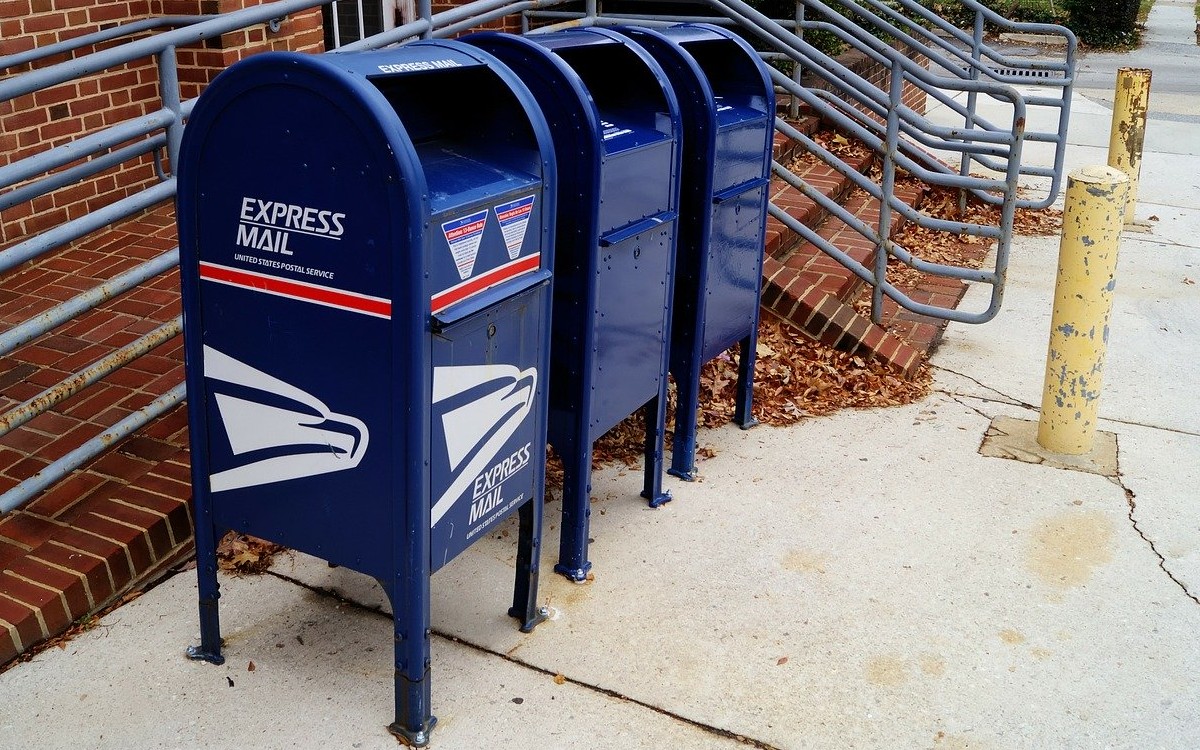
By Lindsay Street, Statehouse correspondent | South Carolina state law mandates voters must have one of a limited list of excuses to vote early or vote by mail. Avoiding a pandemic is not on the list.
Still, the state’s election agency has reported “a significant increase” in absentee voting requests.So far, 35,666 absentee applications have been requested for the June 9 primaries. To put that number in perspective, 60,595 absentee ballots were issued in the June primary in 2016, and a majority of those ballots were for in-person absentee voters, Whitmire said.
“This is a significant increase,” S.C. State Election Commission spokesman Chris Whitmire said, who added absentee applications would be processed through the mail since voting absentee in-person won’t start until May 11, these will be processed through the mail.
In the 2016 general election, counties processed more than 500,000 absentee ballots. Whitmire said it “surpassed” what many counties could handle on absentee ballots.
“Our absentee process is not built for high volume. It’s really intended for a small subset of people,” he said.
One of the biggest concerns is a backup in counting ballots, especially for the general election, with results not available for a day or more after voting, Whitmire said. By law, absentee ballots cannot begin being counted until 9 a.m. on Election Day.
A Senate-passed bill, S. 867, sought to allow counting beginning the day before but, since Feb. 25, it has remained in the House Judiciary Committee and will likely die there as the session is all but ended.
Voters try to cite pandemic
Some voters in Charleston County have tried to cite the pandemic as a reason for their ballot request, according to County Election Project Manager Isaac Cramer, but since that’s not a listed reason, his office points to the list of excuses allowed. Reasons include being over the age of 65, having a disability and needing to work the day of election.
“Usually some people can fit in one of these categories but some of these people have lost their jobs so working is not an excuse,” Cramer said, adding that he encourages all people over the age of 65 to request absentee-by-mail ballots.
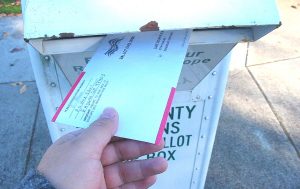
To vote by mail in South Carolina under existing rules, voters call their county voter office, request an absentee ballot, and then must receive and send back an application to obtain that ballot, Cramer said. If a voter qualifies, he or she can request absentee ballots for all elections later in the year.
The pandemic appears to be impacting poll workers, too.
League of Women Voters of South Carolina Vice President Lynn Teague said there are growing concerns for poll workers, who tend to be elderly and “firmly within the danger zone” for contracting a deadly form of COVID-19.
“Are they going to sign up for $100 to sit there for 12 hours while everybody from the neighborhood comes in and shares germs with them?” Teague said.
Whitmire said counties are reporting hearing “it’s not worth my life” from poll workers, and hearing from facilities balking at their use during the pandemic, which could result in polling locations being moved or consolidated.
A question of authority
In the last few weeks, the state Election Commission, a few Democratic lawmakers, and the S.C. Association of Registration and Election Officials asked Gov. Henry McMaster to consider earlier voting and no-excuse absentee voting, and to begin counting votes earlier for the June primaries and November general election to help voters and poll workers avoid coming in contact with coronavirus.
“The main issue is that our elections, as currently prescribed by law, require large numbers of people to congregate in one place — something that everyone is currently being asked not to do by public safety and health officials,” Elections Commission Executive Director Marci Andino wrote McMaster and top legislators March 30.
At the Statehouse, three Democratic lawmakers also sent a letter to McMaster in late March to ask for an extension of absentee voting, and allowing for no excuses.
“Unfortunately, there’s not a bipartisan effort on this,” Columbia Democratic Rep. Beth Bernstein said. The letter was also signed by Sumter Democratic Sen. Thomas McElveen and Charleston Democratic Rep. Leon Stavrinakis. “We need to be prepared for June at a minimum … We can’t just sit here and not do anything.”
Whether McMaster has the authority to expand absentee voting options in the state may need to be decided by lawyers, some say. McMaster’s office has not responded to a request for comment for this story. The only authority on elections McMaster has exercised, so far, has been postponing elections in March and April to a future date, according to Whitmire.
Other states are trying to navigate the unknown waters, too, as state legislatures typically have the authority to alter elections, not governors, and the legislatures are not convening during the pandemic.
Funding held up
The state legislature included $15 million to be used at the governor’s discretion to help voters and poll workers stay safe at the polls — but that money has been held up after a squabble between the House and the Senate.
“(The funding) will go a long way toward helping us conduct elections amidst the coronavirus pandemic. However, we still have the question of whether we can conduct elections any different than what is prescribed by law,” Whitmire said. “We’re looking at things we can do under our current structure, which is doing things to protect poll managers and voters (using masks, sanitizing wipes, styluses for the screen).”
Whitmire said he does not have an estimated cost on such equipment, and that the agency is in the process of ordering it.
“What we really need to know is what do we have authority to do?” Whitmire said, adding that the agency has reached out to the governor’s office. “We still view the delay of the primaries as a possibility … but we are still moving forward.”
- Have a comment? Send to: feedback@statehousereport.com
Blacks more likely to die from coronavirus, data show
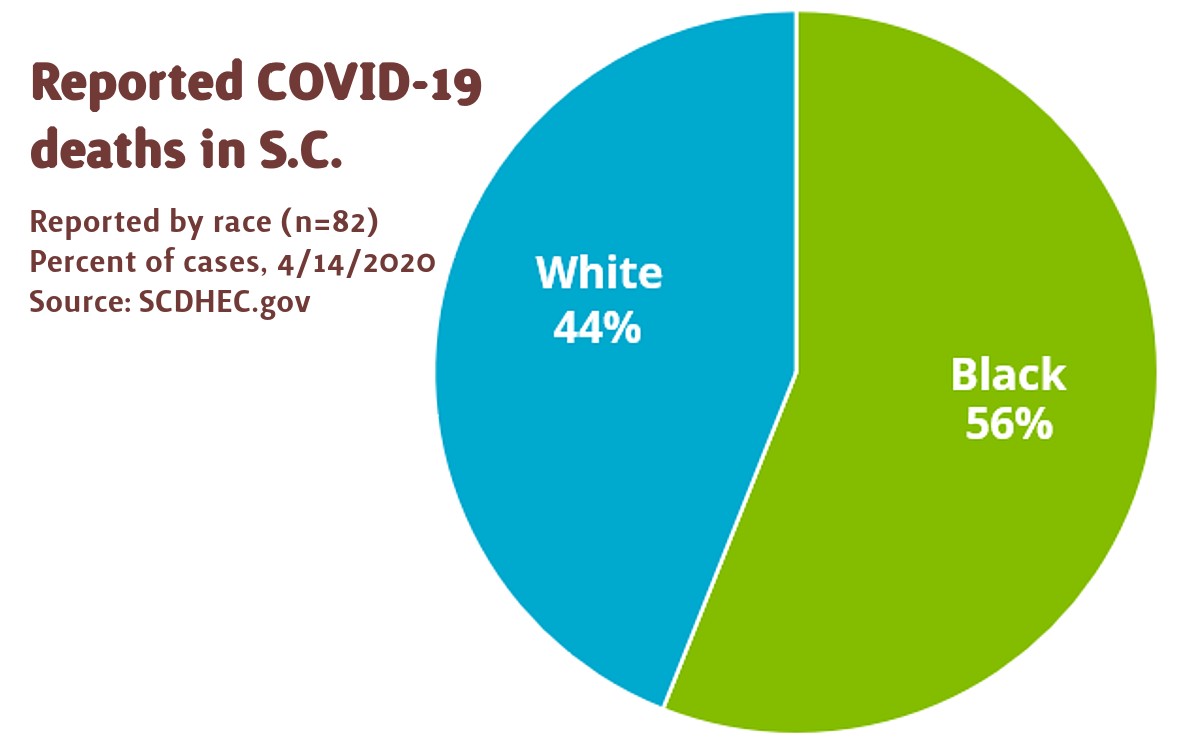
By Lindsay Street, Statehouse correspondent | It’s an adage that has hit home in South Carolina during the coronavirus pandemic: “When white folks catch a cold, black folks get pneumonia.”
Data released by the state’s health agency shows the coronavirus pandemic is no different. While 41 percent of confirmed coronavirus cases in South Carolina are black people, 56 percent of COVID-19 deaths are of African Americans, according to the S.C. Department of Health and Environmental Control.
“Hey, that ain’t news,” Orangeburg Democratic Rep. Gilda Cobb Hunter told Statehouse Report this week. “We have got to get serious about addressing inequities in our system.”
The most common underlying health conditions among the COVID-19 dead are heart disease, diabetes and high blood pressure — health conditions that disproportionately affect minorities. DHEC released this statement about the racial disparity:
“Underlying medical conditions such as diabetes, heart disease, hypertension, obesity and asthma might make it more likely that African Americans are admitted to the ICU or die from the disease.”
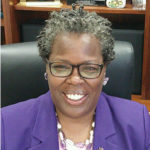
But Cobb Hunter said what’s missing from conversations about the pandemic is “delving into the systemic issues” about why more black and brown people are dying from this disease. Why are they more predisposed to underlying health conditions?
“To not address why that disparity is there doesn’t address the problem because it’s too difficult for people to talk about and admit that systemic and institutional racism is at the heart,” she said, adding that some will “want to accuse you of playing the race card” for saying that.
Spartanburg Democratic Rep. Rosalyn Henderson-Myers sent a letter Tuesday to Gov. Henry McMaster to ask for the creation of a task force to address health care in minority communities.
In an online discussion on the pandemic Wednesday, Democratic U.S. Rep. Jim Clyburn of South Carolina was asked to discuss the disparity in African American outcomes with the disease.
“We have to take a hard look at our educational structure, at our health infrastructure and see what we can to make sure everybody has access and everybody can afford the greatnesses we have in this country,” he said.
In other news:
Clyburn pushes for states like S.C. to expand Medicaid. As he mourned the death of a cousin Wednesday morning, U.S. Rep. Jim Clyburn said he will push to “bring in” states like South Carolina that haven’t expanded Medicaid. Read more in our sister publication, Charleston City Paper.
- Related: Columbia Democratic Rep. Kambrell Garvin published an op/ed this week on the need to expand Medicaid. Read it here.
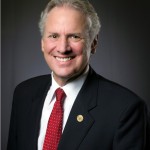
McMaster offers ‘solution’ for state budget. Gov. Henry McMaster pledged Thursday to call the legislature back to Columbia after the coronavirus pandemic has ebbed so lawmakers wouldn’t feel the pressure to return before the May 14 end of session, when the number of cases in the state could be at their peak. Last week as the House and Senate sought to fund state government and pass disaster aid in a one-day meeting, an argument over whether Santee Cooper should be allowed to enter long-term contracts ate up time, leading to the House to adjourn before addressing the Senate’s resolutions. In response to McMaster’s offer, House Speaker Jay Lucas issued this statement that blamed state-owned utility Santee Cooper: “It is unfortunate that a rogue state agency has put our state in a position where the governor’s actions are necessary.”
More calls being made for a pandemic task force or czar. Camden Democratic Sen. Vincent Sheheen wrote an op/ed this week pushing for a COVID-19 task force days after The Post and Courier called for a pandemic czar. In the March 27 issue of Statehouse Report, Orangeburg Democratic Sen. Brad Hutto made a similar request: “We need to revisit how we are managing this,” Hutto said. “It isn’t just going to (go on ) for three days and gone … It’s multifaceted. So I think the governor should task a czar or somebody who’s got a more comprehensive background in all of state government to manage us through the pandemic. He can’t micromanage all of this himself.”
Suicide prevention coalition urges S.C. to call. Lexington Republican Sen. Katrina Shealy, who co-chairs the S.C. Suicide Prevention Coalition, told Statehouse Report she is worried about the state’s high anxiety coupled with rising gun and liquor sales. The coalition published a letter urging South Carolinians feeling a need to self harm to call the National Suicide Prevention Lifeline at 800-273-8255 or text “Home” to 741741. If you or someone you know is experiencing a mental health crisis, you can also reach out to the S.C. Department of Mental Health’s crisis response line at 833-364-2274.
- Have a comment? Send to: feedback@statehousereport.com
We’re proud to offer Statehouse Report for free. For more than a dozen years, we’ve been the go-to place for insightful independent policy and political news and views in the Palmetto State. And we love it as much as you do.
But now, we can use your help. If you’ve been thinking of contributing to Statehouse Report over the years, now would be a great time to contribute as we deal with the crisis. In advance, thank you.
— Andy Brack, editor and publisher
BRACK: Intentional acts of kindness soothe during crisis
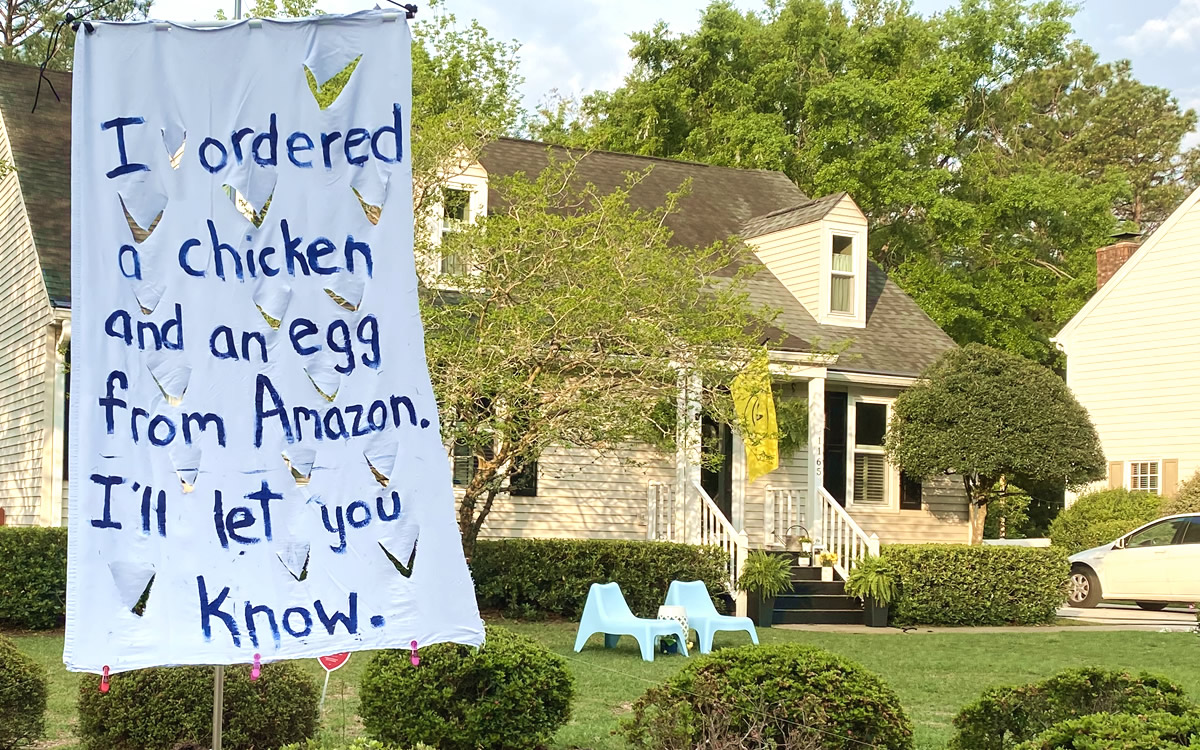
By Andy Brack, editor and publisher | This coronavirus pandemic is causing a lot of misery with kids stuck at home with online school, parents missing work that puts food on the table, companies closing. And there’s nothing left to watch on television.
 But amidst the gloom are bright spots of kindness. Neighbors you haven’t spoken with in months are saying hello. You let someone go ahead of you in line at the grocery store. Manners seem to be back everywhere except in Washington, D.C.
But amidst the gloom are bright spots of kindness. Neighbors you haven’t spoken with in months are saying hello. You let someone go ahead of you in line at the grocery store. Manners seem to be back everywhere except in Washington, D.C.
“I’m hearing people are making it and not complaining,” said Charleston author Nathalie Dupree. “Everyone is being very kind to us, bringing us food, making deliveries. The only complaints I hear are about other people not being respectful of guidelines when in stores.”
The Rev. Kylon Middleton, senior pastor at Mount Zion AME Church in Charleston, noticed similar graciousness as he’s been talking with people.
“I am noticing that people are kinder and more intentional,” he said. “As I walk in my neighborhood, either early morning or later in the day, I encounter folks who are being more intentional about speaking and acknowledging the presence of others, respectfully at a distance, than before the pandemic.
“Even from afar, I see the warmth and hope in the eyes of those with whom I meet. I see a resiliency of spirit that continues to persevere amidst the uncertainty of our times. I see generosity and consideration in something as subtle as negotiating space on a sidewalk or being mindful at the grocery store to only buy what’s needed so that someone else and their family can have access to basic items.”
Sumter Mayor Joe McElveen says the virus is challenging everyone to be better.
“For instance, I may be a hardliner who thinks that ‘stay at home’ is for pansies and that I will not die from COVID-19; but I also have a mother, sister, wife or daughter whom I do no not wish to kill or even infect,” he observed. “Do I really enjoy sitting with 70,000 people at a sporting event; or am I kind of liking time around the house with my family? Lots of things we held as indispensable are turning out not to be so important after all.”
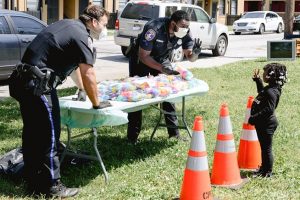
State Rep. Chandra Dillard, D-Greenville, says the pandemic is causing South Carolinians to be more purposeful about their time with family members.
“My Facebook is full of examples of parents dancing with their kids (and) sharing generational music and simply talking,” she said. “Communities have become innovative and collaborative about how to serve our most vulnerable populations. This has gotten organizations out of their silos and combining resources.”
Perhaps what’s most interesting is how all of this kindness seems to be organically contagious — that people are doing it on their own, despite spats about politics and nonsense from state and national leaders.
The recent issue of the Charleston City Paper highlighted nine stories of kindness that included a Mount Pleasant mom and daughter who posted a Joke a Day in their Snee Farm yard, only to be reprimanded by the homeowners’ association for breaking a sign rule. (Boo, HOA.) There’s an artist who paints hearts to give to health care workers. Barbecue king Rodney Scott is providing food for first responders. Charleston police partnered with the city’s parks department to offer safe pop-up Easter egg giveaways for kids. A photographer made fun chalk drawings for backgrounds for neighborhood photos.
This is exactly how people across our state and nation should be responding. And news media should be reporting more of these kinds of stories, in addition to the stark realities and challenges posed at home and abroad by the coronavirus.
South Carolina, launched as a business proposition 350 years ago, is resilient. Her people will get through this pandemic, despite dramas in state and national politics. For now, we have to continue to be patient, stay distanced and wait until it’s safe to move toward what will be a new normal.
In the meantime, perform intentional acts of kindness. You’ll be glad you did, as Winston Churchill once alluded to: “We make a living by what we get, but we make a life by what we give.”
- Have a comment? Send to: feedback@statehousereport.com.
ACLU of South Carolina
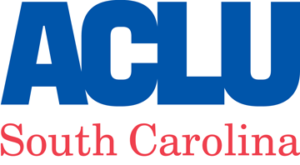 The public spiritedness of our underwriters allows us to bring Statehouse Report to you at no cost. This week’s spotlighted underwriter is the American Civil Liberties Union. The ACLU of South Carolina is dedicated to preserving the civil liberties enshrined in the U.S. Constitution and Bill of Rights. Through communications, lobbying and litigation, the ACLU of South Carolina works to preserve and enhance the rights of all citizens of South Carolina. Foremost among these rights are freedom of speech and religion, the right to equal treatment under law, and the right to privacy.
The public spiritedness of our underwriters allows us to bring Statehouse Report to you at no cost. This week’s spotlighted underwriter is the American Civil Liberties Union. The ACLU of South Carolina is dedicated to preserving the civil liberties enshrined in the U.S. Constitution and Bill of Rights. Through communications, lobbying and litigation, the ACLU of South Carolina works to preserve and enhance the rights of all citizens of South Carolina. Foremost among these rights are freedom of speech and religion, the right to equal treatment under law, and the right to privacy.
More questions for our governor
To the editor:
![]() Dear Governor McMaster: Let’s use DSS caseworkers for contact tracing.
Dear Governor McMaster: Let’s use DSS caseworkers for contact tracing.
South Carolina needs a comprehensive plan to begin opening back up for business. Part of the plan is to expand testing and to implement contact tracing to identify those who have been exposed to the virus. Ideally, we’d have trained state employees in every county who understood the importance of taking detailed written reports and who know basic investigative techniques.
Since our public schools are currently closed due to the COVID 19 pandemic, the Department of Social Services reports that child abuse and neglect referrals have dropped substantially as many of those reports come from the public schools. Why not ask DSS to assign caseworkers in each county to perform contact tracing? The identity of those contacted would remain confidential.
DSS caseworkers would call those known to have been exposed in their county requesting them to voluntarily quarantine for 14 days and to report any symptoms. This would not require the time-consuming process of hiring and training new state employees. DSS has offices in every county with well-trained social workers who could track the coronavirus and report their findings to DHEC. A virtual training session for assigned caseworkers could be led by DHEC doctors online. They would be ready to go once you begin lifting the stay-at-home restrictions.
— Tom Ervin, Greenville, S.C.
NOTE: Ervin, a former state judge and member of the S.C. House, is a member of the S.C. Public Service Commission.
What do you think?
We love hearing from our readers and encourage you to share your opinions. But you’ve got to provide us with contact information so we can verify your letters. Letters to the editor are published weekly. We reserve the right to edit for length and clarity. Comments are limited to 250 words or less. Please include your name and contact information.
- Send your letters or comments to: feedback@statehousereport.com
Happy bronze
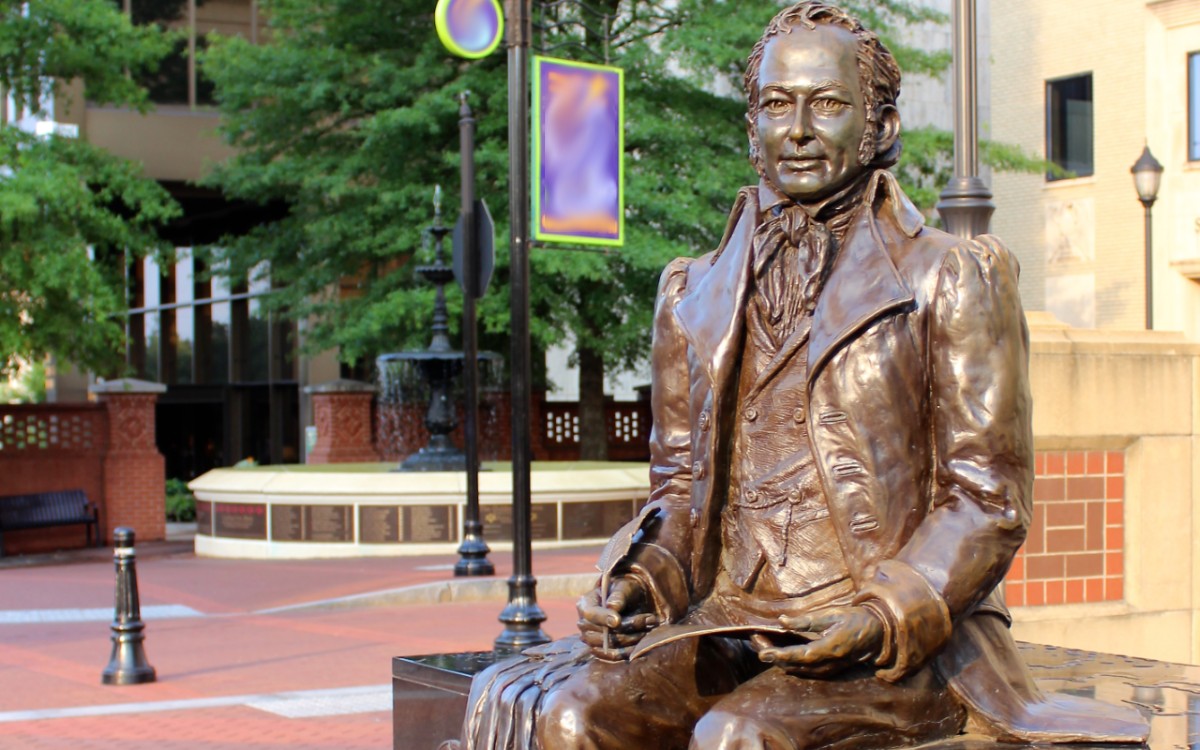
Seen this happy bronze before? Who is it and where? Send your best guess to feedback@statehousereport.com. And don’t forget to include your name and the town in which you live.
Our previous Mystery Photo
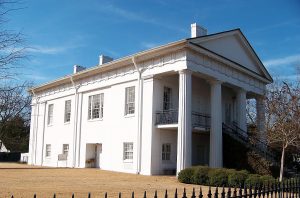 Our April 10 image, “Classic white building,” shows the old courthouse in the hometown of cartoonist Robert Ariail, who was among the first to identify the classic Camden building by architect Robert Mills. Congratulations to other sleuths, who were less geographically privileged: Barry Wingard, Jane Hart Lewis and Jacie Godfrey, all of Florence; Jay Altman, Pete Poore, Peter Dworjanyn and Elizabeth Jones, all of Columbia; Bob Giangiorgi; George Graf of Palmyra, Va.; Henry Eldridge of Tega Cay; Philip Cromer of Beaufort; Bill Segars and Don Clark, both of Hartsville; Katherine Beard of Camden; Frank Bouknight of Summerville; Lawrence Moore of Folly Beach; and Vic Carpenter of Lugoff.
Our April 10 image, “Classic white building,” shows the old courthouse in the hometown of cartoonist Robert Ariail, who was among the first to identify the classic Camden building by architect Robert Mills. Congratulations to other sleuths, who were less geographically privileged: Barry Wingard, Jane Hart Lewis and Jacie Godfrey, all of Florence; Jay Altman, Pete Poore, Peter Dworjanyn and Elizabeth Jones, all of Columbia; Bob Giangiorgi; George Graf of Palmyra, Va.; Henry Eldridge of Tega Cay; Philip Cromer of Beaufort; Bill Segars and Don Clark, both of Hartsville; Katherine Beard of Camden; Frank Bouknight of Summerville; Lawrence Moore of Folly Beach; and Vic Carpenter of Lugoff.
Altman shared, “Different sources state it was completed in 1826 or 1827. The original Mills design had six Ionic columns. The 1847 renovation replaced the six Ionic columns with four Doric columns, and added a second story balcony and a central staircase. The courthouse was closed in 1906. During the 1930’s the Works Progress Administration restored the building. The courthouse currently houses the Kershaw County Chamber of Commerce and the Camden – Kershaw County Visitors Center.”
- Send us a mystery: If you have a photo that you believe will stump readers, send it along (but make sure to tell us what it is because it may stump us too!) Send to: feedback@statehousereport.com and mark it as a photo submission. Thanks.
Camp Sevier
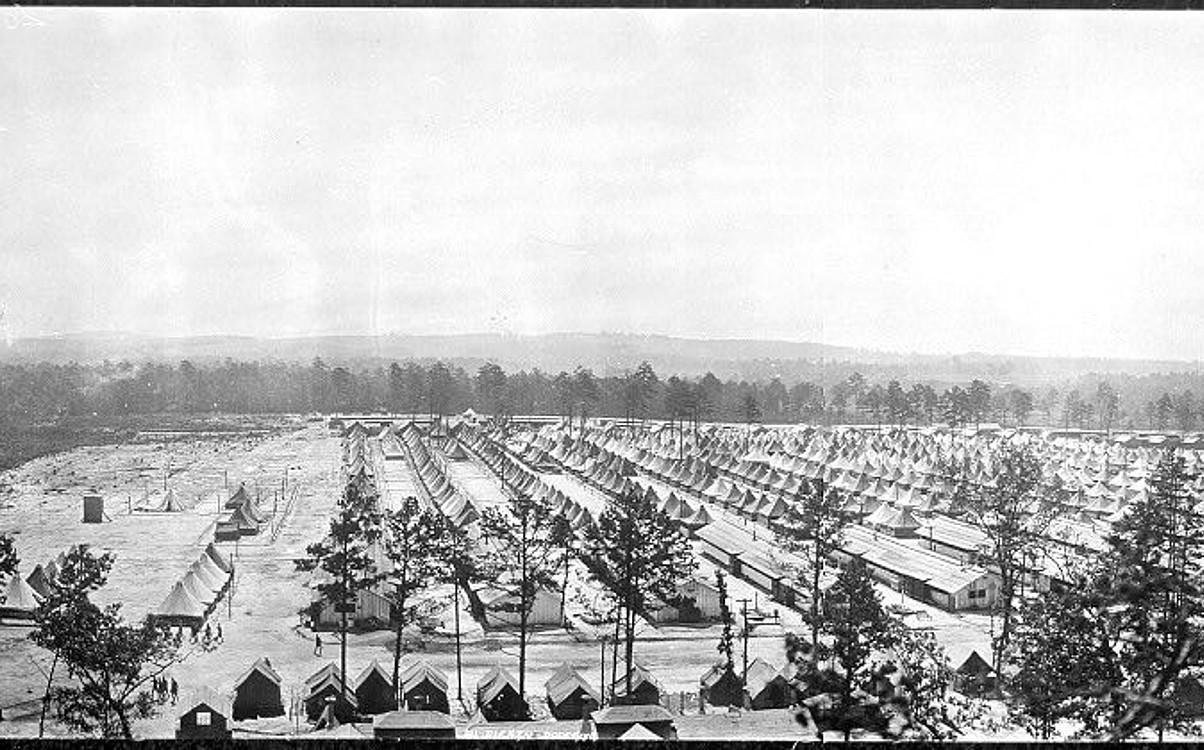
Camp Sevier was a temporary cantonment site in Greenville County created to train federalized National Guard soldiers during World War I. It was named in honor of the Revolutionary War hero John Sevier, a leader of patriot militia at Kings Mountain and later governor of Tennessee.
Soldiers from South Carolina began to occupy the site, four miles northeast of the city of Greenville, on July 10, 1917. Construction began a week later, and the formal establishment of the post took place on July 18. During the next two months, various National Guard units from South Carolina, North Carolina, and Tennessee began to arrive at the camp. Before training could begin in earnest, land had to be cleared and facilities constructed. Once all units had reported, soldiers were trained in a range of common infantry skills and in new modes of warfare, such as gas defense and the use of the machine gun.
Covering some 1,900 acres, the camp provided ample room for artillery instruction as well. This first group of guardsmen was formed into the Thirtieth, or “Old Hickory,” Division, which trained at the post until May 1918 and was followed by the Eighty-first and Twentieth Divisions, respectively. In all, an estimated 100,000 men had undergone vital training at Camp Sevier by the spring of 1919. With the signing of the Armistice on Nov. 11, 1918, the post was designated as a demobilization center on December 3 and was closed as a military training facility on April 8, 1919.
— Excerpted from an entry by Samuel K. Fore. This entry may not have been updated since 2006. To read more about this or 2,000 other entries about South Carolina, check out The South Carolina Encyclopedia, published in 2006 by USC Press. (Information used by permission.)
ABOUT STATEHOUSE REPORT
Statehouse Report, founded in 2001 as a weekly legislative forecast that informs readers about what is going to happen in South Carolina politics and policy, is provided to you at no charge every Friday.
Meet our team
- Editor and publisher: Andy Brack, 843.670.3996
- Statehouse correspondent: Lindsay Street
Buy the book
Now you can get a copy of editor and publisher Andy Brack’s We Can Do Better, South Carolina! ($14.99) as a paperback or as a Kindle book ($7.99). . The book of essays offers incisive commentaries by editor and publisher Andy Brack on the American South, the common good, vexing problems for the Palmetto State and interesting South Carolina leaders.
More
- Mailing address: Send inquiries by mail to: 1316 Rutledge Ave., Charleston, SC 29403
- Subscriptions are free: Click to subscribe.
- We hope you’ll keep receiving the great news and information from Statehouse Report, but if you need to unsubscribe, go to the bottom of the weekly email issue and follow the instructions
- © 2020, Statehouse Report, a publication of City Paper Publishing, LLC. All rights reserved.
- Read our sister publications: Charleston City Paper (every Wednesday) | Charleston Currents (every Monday.



